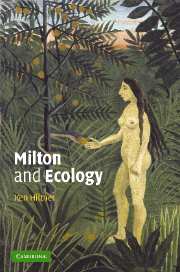Book contents
- Frontmatter
- Contents
- Acknowledgments
- Preface
- Introduction
- PART I HAVING PLACE
- PART II THE UNDERLYING IMPORTANCE OF PLACE
- 5 The New Testament's call to place: Paul's and Luther's deconstructions
- 6 Rejecting the placeless ancient doctrines: confusing Paradise Regained
- 7 The Old Testament's call to place: Job's wisdom in Milton's poetry
- 8 The influence of time on place: forbidding unripe fruit
- 9 Place, body, and spirit joined: the Earth–Human wound in Paradise Lost
- Notes
- Select bibliography
- Index
7 - The Old Testament's call to place: Job's wisdom in Milton's poetry
Published online by Cambridge University Press: 15 December 2009
- Frontmatter
- Contents
- Acknowledgments
- Preface
- Introduction
- PART I HAVING PLACE
- PART II THE UNDERLYING IMPORTANCE OF PLACE
- 5 The New Testament's call to place: Paul's and Luther's deconstructions
- 6 Rejecting the placeless ancient doctrines: confusing Paradise Regained
- 7 The Old Testament's call to place: Job's wisdom in Milton's poetry
- 8 The influence of time on place: forbidding unripe fruit
- 9 Place, body, and spirit joined: the Earth–Human wound in Paradise Lost
- Notes
- Select bibliography
- Index
Summary
These are my best days, when I shake with fear.
John DonneFrom the discussion of the previous section it should not be inferred that the wisdom championed in 1 Corinthians is entirely a New Testament innovation. Indeed, the passage in 1 Corinthians on which both Heidegger and Luther would base their deconstructions (1:19: “I will destroy the wisdom of the wise, and will bring to nothing the understanding of the prudent”) is a near faithful rendering of Isaiah 29:14. Paul quotes from Isaiah exactly as it would have appeared in the Greek translation of the Hebrew available to him, the Septuagint, with one minor exception: the second verb in Paul's version, atheteso (in the Authorized Version, “I … will bring to nothing”), is a change from the Septuagint's krupso, which is an accurate translation of the Hebrew satar, “to conceal.” As atheteso carries the meaning of rejecting or disregarding so as to nullify or make void, Paul is taking Isaiah's claim that the wisdom of the wise will be concealed and strengthening it to suggest that, in light of the revelation of the cross, the wisdom of the Greeks is, through this radical deconstruction, simply undone.
Though 1 Corinthians (and its roots in the Old Testament) certainly had much to do with the rejection of Greek learning in Paradise Regained, it is also the case that the Book of Job not only influenced the form of Milton's brief epic (as Barbara Lewalski has well argued), but as it prefigured 1 Corinthians' rejection of certain “wisdom,” Job also reveals a great deal of the foundation for Milton's position regarding learning.
- Type
- Chapter
- Information
- Milton and Ecology , pp. 102 - 112Publisher: Cambridge University PressPrint publication year: 2003



